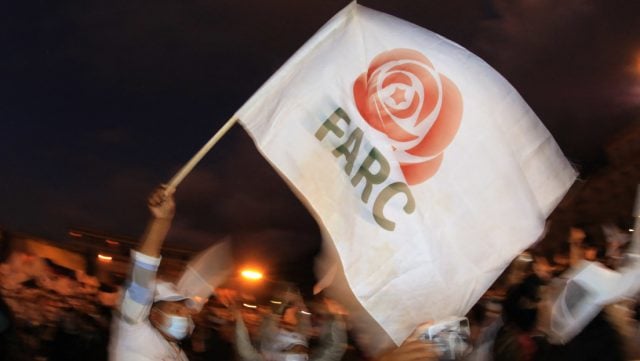To believe in and support the efforts on peace in Colombia does not translate into immunity, much less an absolute guarantee to avoid being a victim of the violence entrenched in the country. The complexity of the internal armed conflict, installed for more than half a century, leaves victims almost daily throughout its territory.
The massacres and systematic murders against social leaders, peasants, indigenous people and former guerrillas, the latter involved in the 2016 peace treaty, are part of a regrettable daily life, focused on the persecution and disappearance of those who think differently, explains a report by RT.
The municipality of Buenos Aires, one of the 42 that make up the department of Cauca, has become the focus of this type of selective crimes, perpetrated against a group of people who believed in the path of productive work as a better alternative for their future and that of their country.
In the last two months, Buenos Aires, the place where the Cooperativa Ecomún La Esperanza (Cecoespe) was established, and created in October 2017 by 71 ex-combatants who made up the Territorial Space for Reincorporation of La Elvira and which has had great success with the production of the brand Café Sabor La Esperanza —participants of the World Coffee Fair—, has been the scene of several attacks by hitmen against its members.
The most recent of the murders occurred against Yorbis Valencia, a former guerrilla who was known in the FARC as ‘Anderson Guerrero’ or ‘Macancán’ and who formally joined the community in 2017, after the signing of the Peace Agreement. Yorbis knew that laying down his arms was no guarantee of anything, yet he took the risk of living openly to support the end of the internal war.
«It has been for a long time that anyone who thinks differently, is massacred. Then, one starts to think: we think differently from them, if they don’t give us guarantees, then who knows what happens from then on. If they don’t give us the guarantees, you know they are going to kill us. But we are going to run that risk», said Valencia in 2017, during an interview with the independent journalist Mercy Insuasti, which was published in the newspaper El Espectador.
Selective murders in Colombia
The first of the murders in the last 60 days, in Colombia, against the members of the successful Cecoespe Cooperative, was perpetrated on May 21 against José Ignacio Loaiza, who was killed during an attack that also targeted former guerrilla Camila Cienfuegos.
José Ignacio was murdered by a group of armed men who shot him when he was in Popayán, where he remained hospitalized for several days until he died a week later, on May 28, as a result of his serious injuries.
The next victim occurred the following month and was Norelia Trumpeta Hachaue, a 25-year-old young woman, also murdered in Buenos Aires. Her murder was carried out during the night of June 25, when she was shot by hitmen.
The next to fall was Yorbis Valencia, on July 25, when several men shot and killed him while on his way to his house in the San Francisco path, where he had lived after the ex-combatants who lived in the La Elvira reincorporation space began to be dispersed by death threats.
The Valencia murder resulted in the number 279 executed against the ex-guerrillas who signed the 2016 Peace Accords.
The OAS Mission to Support the Peace Process in Colombia asked the State to clarify his murder, urged it to investigate and also to strengthen the protection measures for people in the process of reincorporation.
The history of the Cecoespe Cooperative
According to El Espectador, the Cecoespe Cooperative began with the investment made by 94 ex-combatants with funds received during the peace process. After its foundation, the group of farm workers had 134 ex-guerrillas associated and involved in the coffee project, described as one of the most emblematic products of the reincorporation.
But behind the productive project there is a bitter history of persecution, threats and exile that has forced the leadership of the cooperative to move from their original settlement, leaving them vulnerable to violence and in search of land to continue their aspiration to a life of peace.
Before the most recent murders, several violent acts had already been perpetrated against the leaders of the cooperative. One of the most violent events occurred on December 2, 2019, when several hitmen killed Manuel Santos Yatacué. After assassinating him, they took the victim’s vehicle, parked it in front of the house of Mario Rodríguez, president of Cecoespe, and set it on fire.
The wave of threats against cooperative members spread to all its members and thus forced displacements from the area of growing conflict began to occur, with a higher incidence between December 2019 and January 2020. A situation that is repeated in the rest of the country, like the murder against Yeison Sarmiento, in San José del Guaviare on July 25, a fact that raised the number of former combatants killed to 280 since 2016, 31 of them this year.
Thus, many of the ex-guerrillas have ended up in the Santander de Quilichao and Popayán regions. Another group is in Timbío, where they maintain the coffee project, on the Las Veraneras farm; and there are still 24 other ex-combatants on the sidewalks and the capital of Buenos Aires.
According to the Colombian media, the threats began after the entry into Buenos Aires of a dissident FARC structure that is supposed to be under the control of Leider Johani Noscue, alias ‘Mayimbú’.
Meanwhile, the ex-combatants have asked the Government to transfer them to a new territorial space, but the Agency for Reincorporation and Normalization has not succeeded to do this. For its part, the Special Jurisdiction for Peace is advancing the process to give precautionary protection measures and has asked the Executive to guarantee the safety of this vulnerable population.


